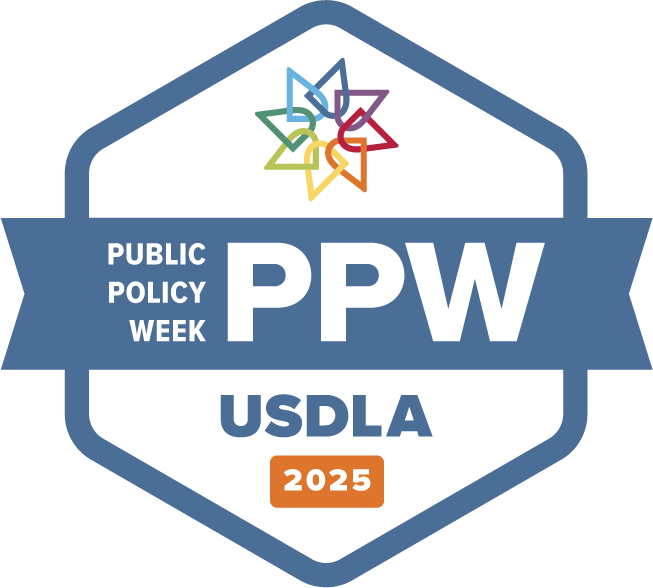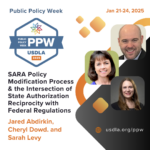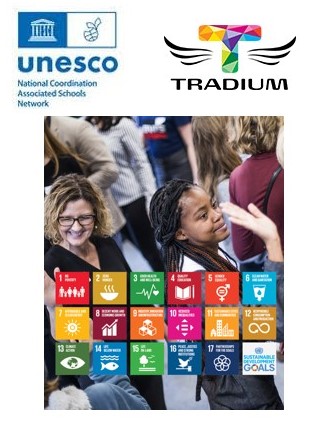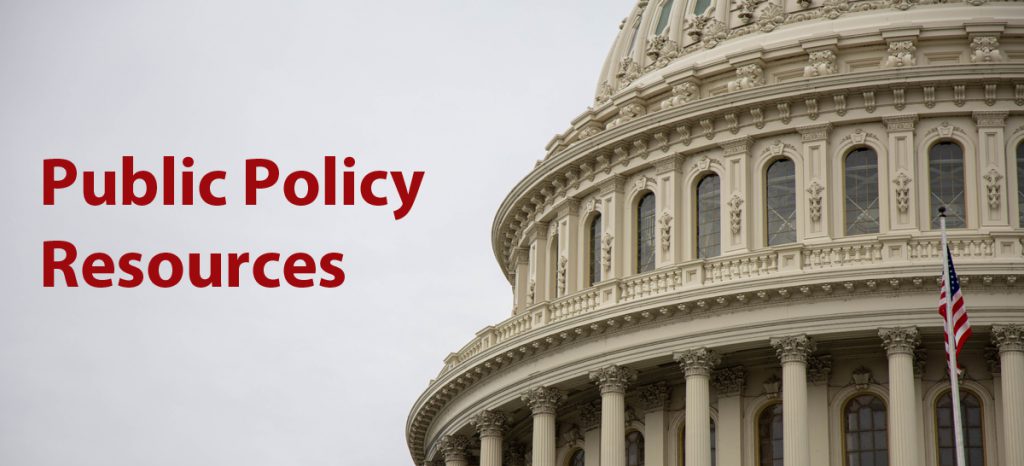
There are dozens of public policy issues related to digital/distance learning near and dear to the hearts of the USDLA Board of Directors and its members. Our most recent focuses include:
- The impact of Artificial Intelligence (AI) within education
- The lack of US distance/digital learning preparedness in our K-12 schools
- Workforce development pertaining to micro credentialing and re-training our workforce
- How to make more secondary education more accessible through digital/distance learning
Be sure to tune into our events where you can hear from experts on the educational policies shaping our country.
Share your Voice on Public Policy: Let us know what you’d like to learn in our upcoming Public Policy webinar series by clicking here to complete the proposal form. Webinars are one-hour and include Q&A. Questions, thoughts, ideas? Send an email to committee chair Alexandra Salas: asalas@usdla.org.
Our next event is Public Policy Week 2025 (PPW25).
2025 PPW – January 21st-24th
The United States Distance Learning Association Will be Hosting Public Policy Week January 21st-24th 2025
Top Issues Impacting Distance/Digital Learning in The Year 2025
Interested in attending? Click the button below to register – its FREE.
This annual meeting of distance/digital learning policy will provide a week of complimentary webinar sessions focused on the most serious challenges facing the industry with respect to education and training.
About PPW
The United States Distance Learning Association (USDLA) has been helping to shape public policy for over 3 decades with respect to digital and distance learning. This year, USDLA is hosting a free virtual series of webinars meant to bring awareness to the policies on the table in Washington, DC that could impact distance/digital learning.
Detailed Schedule
Day 1: Tuesday, January 21st
Tuesday, January 21, 2025 from Noon to 1:00 pm EST
Session: 10 Federal Regulations Impacting Online Education in the U.S
Presenter: Rob Robinson, Senior Strategist and COO, The Hardy Group
A highly-skilled technologist, strategist and trainer, with focused research and writing from earning a doctoral degree, Rob is a leader in the industry. Rob loves to quickly learn from and interpret data, gleaning business insights from artificial intelligence and machine learning-driven analytics to implement effective change management initiatives at scale. His proven expertise at building consensus for strategic plans and new initiatives has helped to develop training and learning development opportunities designed to bring everyone from faculty and staff to executive level administrators and stakeholders into alignment.
Abstract: In listening to, and talking with, the many true experts on these issues, The Hardy Group has been putting together “Ten Things” lists of ideas that you – as a distance learning professional – should be keeping up with. Join this session for a countdown of their 10 Federal Regulations Impacting Online Education in the U.S. Topics include Attendance Taking for Online Courses, Return to Title IV, Distance Ed Data Reporting Requirements, Accreditation Changes, Distance Education Definition, and more. Join the discussion and share what you think is missing from the list? What’s keeping you up at night these days?
Tuesday, January 21, 2025 from 3:00 to 4:00 pm EST
Session: SARA Policy Modification Process & the Intersection of State Authorization Reciprocity with Federal Regulations
Presenters: Jared Abdirkin, jabdirkin@nc-sara.org, Director Institutional Engagement and Initiatives, NC-SARA ——– Sarah Levy, slevy@nc-sara.org, Senior Director, Policy & Regulatory Affairs NC-SARA
Cheryl Dowd, cdowd@wiche.edu, Senior Director, State Authorization Network (SAN) & WCET Policy Innovations
Jared Abdirkin earned his BS degree in Human Development and MS degree in College Student Personnel from the University of Rhode Island. In his professional career to date, he has worked at multiple institutions of higher education focused on academic affairs, program and college leadership, and admission and retention efforts. Highlights of his work include: maintaining and expanding programs to ensure student readiness and seamless transfer; organizing the movement of undergraduate classes from fully in person to combinations of in-person; hybrid and remote in 2020 and 2021; and the stabilization, re-organization, and growth of an Office of Student Life and an Academic and Student Affairs division. Prior to joining NC-SARA, Jared was at the New England Board of Higher Education (NEBHE), primarily focused on SARA as well as serving with a team of Senior Directors to help manage and guide NEBHE internal processes and policies.
Cheryl Dowd directs the activities of the State Authorization Network (SAN), including coordination of staff addressing interstate policy and compliance as well as other ancillary compliance issues. Additionally, she serves the overall WCET membership in addressing emerging and special regulatory issues related to digital learning in postsecondary education. Dowd is a contributing author for a guidebook for understanding the legal basis for State and Federal compliance for activities of post-secondary institutions, State Authorization of Colleges and Universities. Dowd earned her Juris Doctorate from the University of Richmond, master’s degree in Criminal Justice from Bowling Green State University, and bachelor’s degree in Political Science from James Madison University.
Sarah Levy joined NC-SARA in February 2024 as Senior Director, Policy & Regulatory Affairs. Sarah was the Executive Director of Postsecondary Licensing with the Kentucky Council on Postsecondary Education prior to joining NC-SARA. In this licensing role since 2008, she oversaw the state authorization of private institutions operating and soliciting in Kentucky. In addition, upon Kentucky joining SARA in 2016, Sarah was a State Portal Entity contact and a member of the S-SARA Regional Steering Committee. She served as a member of the S-SARA Policy and Administration Working Group. Sarah holds a B.A. in English and Juris Doctor degrees from the University of Kentucky.
Abstract: This session will first review institutional awareness in serving students by interstate distance education that state statutes and regulations must be followed where the student is located. State institutional approval may be obtained by the state where the student is located or by the institution’s participation in reciprocity through the State Authorization Reciprocity Agreements (SARA). In this presentation, we will discuss the SARA Policy Modification Process as well as recent and potentially future U.S. Department of Education actions that may fundamentally alter SARA. The process is guided by principles of transparency, collaboration, and consistency, among regional compacts, states, institutions, and other stakeholders. The process reflects a desire to improve student consumer protections for interstate distance education. As SARA celebrated its 10-year anniversary in 2024, with a robust network of 52 states and territories and over 2,400 institutions, allowing student access to distance education that would not be possible otherwise, we want to ensure a continued focus on improvement and enhancement. At the same time, we want to maintain awareness of the potential for federal developments that could fundamentally alter the agreement. We will share information about the timeline and the steps we have been taking to strengthen SARA, preserve educational opportunities across the U.S., and enhance protections for students participating in distance education. Federal regulations tie state compliance, including through SARA, to institutions offering Title IV Aid. The intersection of state compliance and federal compliance is intended to provide student consumer protection. We will additionally discuss the recent U.S. Department of Education’s actions to develop regulations intended to strengthen protections for students when the institution participates in reciprocity and what we see may be the future of those regulations.
Day 2: Wednesday, January 22nd
Wednesday, January 22, 2025 from Noon to 1:00 pm EST
Session: Implementing UNESCO Values in UNESCO ASP-Network Denmark
Presenters: Gitte Rask Cannon, lecturer, Tradium and Global Citizenship Coordinator for UNESCO ASP Denmark and Stine Sund Hald, National Coordinator for UNESCO Associated Schools Network Denmark.
Stine Sound Hald, a sociologist specializing in youth in upper secondary education, serves as the National Coordinator for UNESCO’s Associated Schools Project Network (ASPNet) in Denmark. With a passion for empowering young people, Stine works to integrate UNESCO’s values into education, fostering global citizenship, sustainability, and intercultural dialogue across Denmark’s 89 ASPNet schools.
As an advisor and facilitator, Stine leads workshops for educational leaders and teachers, focusing on sustainability and digitalization in teaching, operations, and organizational practices through a “whole school approach.” Her expertise lies in aligning educational frameworks with sustainable development goals, emphasizing youth engagement and values-based school development. Stine’s work reflects a strong commitment to the intersection of education, sustainability, and innovation.
Abstract: This presentation explores the pivotal role of the UNESCO Associated Schools Project Network (ASPNet) in Denmark and their efforts to instill UNESCO values in 89 network schools across the country. Key focus areas include introducing the overarching principles of UNESCO, emphasizing global citizenship, sustainable development, cultural heritage, and peace education. It highlights how these principles are integrated into Danish network schools through innovative and inclusive educational practices. Attendees will gain a deeper understanding of how Denmark’s UNESCO ASP-Network schools are empowering students to become proactive global citizens, and contributing to a more sustainable and equitable world.
Wednesday, January 22, 2025 from 3:00 to 4:00 pm EST
Session: Digital Accessibility Matters: Meeting NEW Title II Standards
Presenter: Raymond Rose and Mary Rice
Raymond M. Rose is well known in education circles for his advocacy on digital learning. He has written on digital accessibility for almost two decades. His concern for accessible digital learning began after he was part of the team that created the country’s first virtual high school. His background as a civil rights specialist heightened his awareness of accessibility issues. In 2007 along with a colleague they wrote the first publication addressing accessibility in online learning. Not many people paid attention then but he continued his advocacy. He presented at conferences and wrote another publication in 2014. By that time more people were interested in digital accessibility. He advocated for the Texas Digital Learning Association to offer a digital accessibility course. That was the first of its kind in the country. Other organizations have followed suit.
In April of 2023 when the US Department of Justice (DoJ) published a rule for Title II of the Americans with Disability Act, Ray pushed for education publications to write articles announcing the rule. This rule was the first time accessibility standards were published for state and local governments. The rule applies to all public K-12 schools, community colleges, and public colleges and universities.
Ray has partnered with Mary Rice on publications and presentations for the past five years.Mary Rice is a former public school teacher and current Associate Professor of Literacy in the Department of Language Literacy and Sociocultural Studies at the University of New Mexico. Her research and teaching critique relational aspects of designing and doing digital learning. Recent honors include the Divergent Award for Research Excellence by the Initiative for Literacy in a Digital Age (2021), the National Technology Leadership Initiative Award from the Society for Information Technology in Education (2023), the Diversity Equity and Inclusion Publication Award from Innovations in Special Education Technology—Council for Exceptional Children (2024) and Publication of the Year from the Narrative Special Interest Group—American Educational Research Association (2024). Mary has served as Managing Editor of Online Learning, Special Editor of Distance Education and Professional Development in Education, and Editor-in-chief of the Journal of Online Learning Research. Since 2017, she has collaboratively held over $3 million in federal, state, and private grant funding for equitable access to digital education experiences
Abstract: Did you know the DoJ published a new rule in 2024 requiring all web content and mobile apps for all institutions covered by ADA Title II to be accessible? If your institution is covered by Title II of the ADA, or you sell products to those organizations and institutions, you should attend this session. Come and learn about these new technical specifications defining digital accessibility. You will also be able to learn from others about what they are doing to navigate these new requirements.
Day 3: Thursday, January 23rd
Thursday, January 23, 2025 from Noon to 1:00 pm EST
Session: Making Secondary Education Accessible Through Digital Learning

Presenters: Landmark College, Denise Jaffe and Michelle Deal.
Denise Jaffe is a seasoned education professional with 25 years of experience, serves as Co-Director for Undergraduate LC Online, where she champions equitable and accessible education. In her role, Denise leads the campus community in advancing online teaching, learning, and instructional technology, overseeing course development and instructor training for LC Online Programs. Denise holds an MBA in Finance, a Master’s in Secondary Education, and a 6th Year Certificate in Educational Technology. As a certified Project Management Professional (PMP) and Certified Professional in Learning and Performance (CPLP), she brings extensive expertise to her work.
Michelle Deal is the Director of Learning Technologies Research and Development at Landmark College. She is part of a cross-functional team who identifies and implements online design and delivery strategies for students who have learning disabilities, ADHD, or Autism. Michelle also directs the research and development of digital learning tools designed with and for neurodivergent populations and those who work with them. She has 30 years of faculty and administrative experience at small colleges and large universities. Michelle is a recent graduate of the Landmark College Institute for Research and Training (LCIRT) post-baccalaureate certificate in Learning Differences and Neurodiversity.
Abstract: While many colleges offer programs for students with learning disabilities (LD) and other learning challenges, Landmark College stands out as the only accredited college in the United States exclusively designed for students who learn differently. Our strengths-based model empowers students with learning disabilities (such as dyslexia), ADHD, autism, or executive function challenges by providing the skills and strategies they need to succeed. LC Online programs extend this mission to college and high school students, offering the academic and social support necessary to thrive in online learning environments. Each course is thoughtfully designed and delivered using research-based best practices to ensure accessibility and engagement for diverse learners. In this session, we will share insights from our research and practical strategies to help higher education faculty, subject matter experts, and course developers create inclusive and effective online learning environments. Discover how to build courses that empower all students to succeed. Join us to explore actionable solutions that advance accessibility in digital and distance education.
Thursday, January 23, 2025 from 3:00 to 4:00 pm EST
Session: Effects of Administrative Changes at the Federal Level
Presenter: John Bellocchio
Abstract: This session will have a focus on policy in the midst of administrative change at the federal level. Each time a presidential administration changes, and the majorities in both houses of Congress change, there is opportunity for USDLA and its membership to be an active part of the policy debate – and of policy implementation. Learn how to utilize pre-existing legislative frameworks to advance the legislative cause of distance learning at the federal, state, and local levels.
Public Policy Day 2024
Thanks for joining us for Public Policy Day 2024. Our free webinar discussed the hottest topics currently being debated at the national level. Become a USDLA Prospect member (free) to view a replay of this webinar.
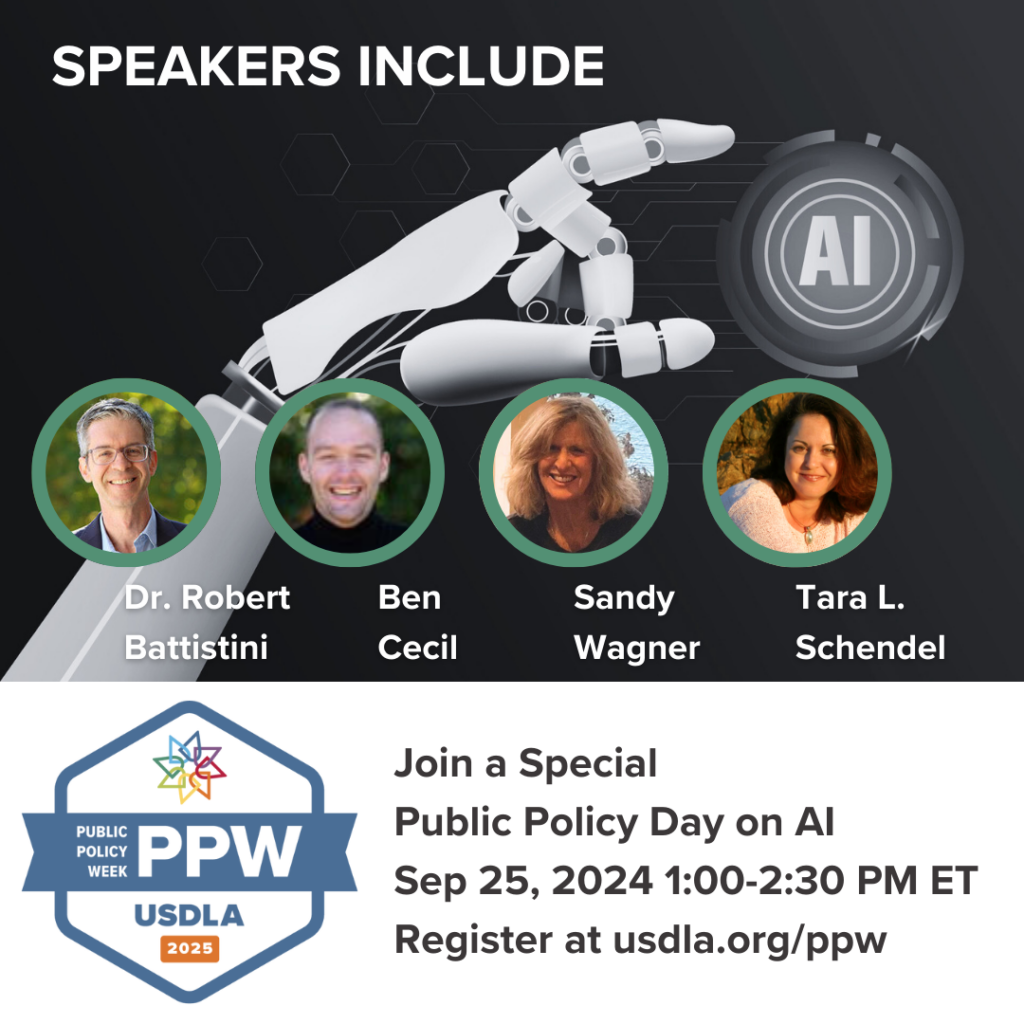
Presenter: Robert Battistini, PhD, interim VP of Academic Affairs & Chief Academic Officer, Centenary University
Bio: Robert Battistini, PhD, is interim VP of Academic Affairs & Chief Academic Officer, as well as Professor of English, at Centenary University. Robert teaches Centenary’s Children’s & YA Literature course. He has published articles on “Images of the Muslim World in Early American Periodicals” and early American novels, and is co-editor of a scholarly edition of Charles Brockden Brown’s Literary Magazine (1803-07). Robert’s administrative work at Centenary focuses on student success through multi-faceted support of the whole student.
Presenter: Ben Cecil, Ph.D. Senior Education Policy Advisor | Third Way
Bio: As a Senior Education Policy Advisor at Third Way, Dr. Cecil works to expand the conversation of value, return on investment, accountability, and quality in American higher education. His work at Third Way emphasizes the importance of institutional accountability, student affordability, transparency, and student debt. He oversees Third Way Education’s public opinion research portfolio, working with external partners to uncover Americans’ and voters’ perceptions of today’s higher education system. He earned his Ph.D. in Higher Education from the Louise McBee Institute of Higher Education, University of Georgia.
Topic: Learn about the Pell Grant program, how it’s funded, and why it matters that Congress works to protect its value for the students who need it the most. Here’s a brief synopsis:
“Today, nearly a third of undergraduate students receive a Pell Grant to help pay for college—the main source of federal support for low- to moderate-income college students. Most of these students come from families making less than $40,000 a year, and many are students of color, first-generation students, or both. The funding for Pell is complex—and today, the maximum Pell Grant covers less than a third of the cost of college. The Pell Grant is the key to college access for many low-income students today and it must be protected to ensure the promise of higher education.”
Presenter: Sandy Wagner, M.A.ED, Academic Specialist, LREC Professionalization Programs, Defense Language Institute Foreign Language Center.
Bio: Sandy Wagner brings a multitude of perspectives and expertise to the language learning process, incorporating primarily linguistic competence, teaching experience, and technology applications into the development of language proficiency. She earned a Master’s in instructional design and online learning from the University of Phoenix and a BA in French Education from University of Illinois Urbana-Champaign
Topic: How DoD current policies on responsible and ethical use of AI have been integrated into learning and development for both instructors and students at the Defense Language Institute to ensure compliance and safe, responsible use.
Session: Department of Defense’s (DoD) current policies and viewpoints on adopting and deploying artificial intelligence (AI).
Presenter: Tara L. Schendel, Academic Advisor for Educational & Information Technology
Defense Language Institute – Washington, DLIFLC
BIO: Tara is DLI- W’s Academic Advisor for Ed and Info Tech guiding and overseeing multiple technology related projects for DLI-Washington and serving and a Technology subject matter expert and liaison for the Defense Language Institute Foreign Language Center. Prior to joining the DLI-Washington team in 2020, Ms. Schendel oversaw and served as an expert advisor for a diverse portfolio of curriculum, testing, and technology projects in a wide variety of languages at DLIFLC in Monterey. Her current focus is on improving the quality of raw data and automating business functions for the DLI-W office, working with DARPA as a transition partner for the Computational Cultural dialog tool, and leveraging AI to identify patterns in teacher and student generated progress data. Tara holds an M.A.in International Policy with a B.A. French Language and Literature and has multiple certificates from the Naval Post Graduate School and the Institute for Defense and Business. She has been formally recognized multiple times for her work in foreign language program development
Topic: Tara will discuss the Department of Defense’s (DoD) current policies and viewpoints on adopting and deploying artificial intelligence (AI). This will cover the DoD’s framework and tools for the responsible and ethical use of data and AI, as well as the role AI plays in our national security.
PPW Survey
After you attend a session, kindly take a moment to fill out the PPW 2025 session survey letting us know your thoughts. We appreciate your feedback as it helps us to constantly improve the event.
Social Media Kit
The official hashtag for this event is #USDLAPPW2025.
Our social media handles are:
- @USDistanceLearningAssoc on Facebook
- @us-distance-learning-association on LinkedIn
- @USDLA on Twitter.
Our logo variations are attached here for presenters and panelists to use in their social media posts and/or to personalize their Zoom backgrounds.
Contact
For questions, suggestions, or to volunteer for PPWW please contact:
Alexandra Salas – asalas@usdla.org
Public Policy Chair

PPW Archives
All PPW sessions will be recorded and the recordings will be available for free to those who register for the webinars, as well as for USDLA members. If you would like to learn more about USDLA membership, please visit https://usdla.org/membership/.
Shared Public Resources
Despite concerns, only 3% of colleges have developed student policy on AI
https://universitybusiness.com/despite-concerns-only-3-of-colleges-have-developed-student-policy-on-ai/
Political Interference in Higher Ed
https://www.aaup.org/issues/political-interference-higher-ed
House and Senate Far Apart on Education Funding for Fiscal Year That Begins Oct. 1
https://www.acenet.edu/News-Room/Pages/House-Senate-Far-Apart-Education-FY-24.aspx
Commentary – What Brown Center scholars will be watching in education policy and politics in 2023
https://www.brookings.edu/articles/what-brown-center-scholars-will-be-watching-in-education-policy-and-politics-in-2023/
Are School Reforms Liberal, Conservative, or Populist? Populism and Education Policy Opinions in the United States, Journal of School Choice, DOI: 10.1080/15582159.2023.2211799
https://www.tandfonline.com/doi/full/10.1080/15582159.2023.2211799
The National Digital Inclusion Alliance NDIA
FCC – Federal Communications Commission legislative proceedings and actions
www.fcc.gov
SBLN State Broadband Leaders Network – WHO is YOUR state broadband Director? Click on your state in the Broadband Directory
To Stay Up-to-date on E-rate, Rural Health Care, Spectrum Policies and Broadband Legislation
Sign up for SHLB Updates here
CooleyEd Education Policy, Technology & Business Check out updates here
National Broadband Map – Searchable by Address Search Now
Western Interstate Commission for Higher Education Go Now
Need to troubleshoot your internet connection? Here is What to Do When Your Internet’s Not Working
All Connect – Allconnect.com has curated a new set of Internet availability resources Check out:
https://www.allconnect.com/blog/back-to-school-speed-up-your-home-internet
https://www.allconnect.com/blog/student-internet-safety-guide
https://www.allconnect.com/blog/student-internet-deals-tech-discounts
Affordable Internet and Digital Learning Resources:
- Affordable Connectivity Program Guide
- This guide contains information about the FCC’s new Affordable Connectivity Program, which helps low-income families stay connected to the internet.
- How to Get Cheap or Free Internet | Reviews.org
- Learn how to easily compare internet plans and prices, where to find free internet, and more ways
- How Much Internet Speed Do I Need?
- We’ll help you figure out how many Mbps you need to stream, game, or work from home.
- How to Use Less Data on Zoom Calls | Reviews.org
- Tips to cutting back on data usage with Zoom
Home and Family Online Safety Resources
- How to Stay Safe Online: Internet Safety Tips and Resources
- Keep your kids and self safe online with these internet safety tips. Learn how to make stronger passwords, install antivirus software, and how using a VPN to keep you safe online.
